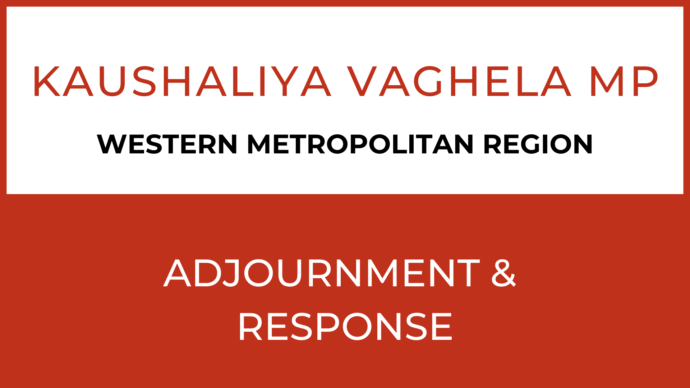Ms VAGHELA (Western Metropolitan): My adjournment matter is for the Minister for Crime Prevention and Minister for Corrections, the Honourable Ben Carroll. I want to bring the Parliament’s attention to some alarming statistics. Victoria’s female prisoner population has nearly doubled over the last decade, with the number of Aboriginal women in prison growing at an even faster rate. Many of the women who are in prison have vulnerable backgrounds. Two-thirds of female prisoners report being a victim of family violence. The Andrews Labor government has recognised that women prisoners are different to men; they have different offending and risk profiles and different needs. That is why the Andrews government committed almost $20 million in the 2019–20 budget to reduce the incarceration of women. Of this, $1.296 million has been allocated to the introduction of women’s employment specialists in women’s prisons to strengthen employment opportunities for women leaving custody. This is in recognition of the fact that over three-quarters of women were unemployed before entering prison and only 10 per cent had year 12 or a tertiary or technical qualification. Gaining employment is a key challenge for women transitioning out of prison, and research has identified that there are distinct differences in the needs of women in relation to employment. Women exiting prison may have to resume childcare responsibilities or work to regain care of their children and reconnect with family. Their work history is often more limited than men’s due to family responsibilities. Family responsibilities may also prevent them from travelling long distances to work, while there may be few job opportunities close to home. Research indicates that the stigma of a criminal record may also be greater for women, as employers may regard women coming out of prison even more negatively than men coming out of prison. However, economic independence and the increased confidence and self-esteem that come from workplace participation play a vital role in preventing women from returning to unsafe relationships, enabling them to access housing and reducing recidivism. The action I seek of the minister is that he visits McAuley Community Services for Women to see firsthand the support they provide to women who have experienced family violence, homelessness or mental health issues to find and maintain employment.
RESPONSE :
Mr CARROLL (Niddrie—Minister for Crime Prevention, Minister for Corrections, Minister for Youth Justice, Minister for Victim Support) (28 November 2019): I thank the Honourable Member for her thoughtful comments and concerns about female prisoners. This is one of the reasons the Victorian Government has invested $20 million on programs specifically targeting women prisoners in this year’s Budget, as she has noted. This included $1,296 million to introduce women’s employment specialists in order to improve the employment outcomes for women exiting prison.
The $20 million investment also builds on previous investments in modernising and enhancing the women’s prison system, including the new $40 million mental health and well-being precinct within the Dame Phyllis Frost Centre. I would be pleased to visit McAuley Community Services. My office is making arrangements for me to visit at a mutually agreeable time. I previously had the privilege of visiting McAuley Community Services in 2018, during my time as Minister for Industry and Employment, and have seen firsthand the positive impact this service has on the lives of women. The Women’s Correctional Services Advisory Committee has also advised me about McAuley and their continued work in providing support for women in the community. McAuley is a Jobs Victoria Employment Network provider, providing tailored employment assistance for women who have a range of needs, as well as specifically supporting women who have experienced family violence. Deloitte Access Economics has recently analysed the work of the agency and has commented favourably on the outcomes and effectiveness of McAuley’s interventions for women who have experienced homelessness, family violence, and mental health issues. I look forward to seeing this firsthand during my upcoming visit.
